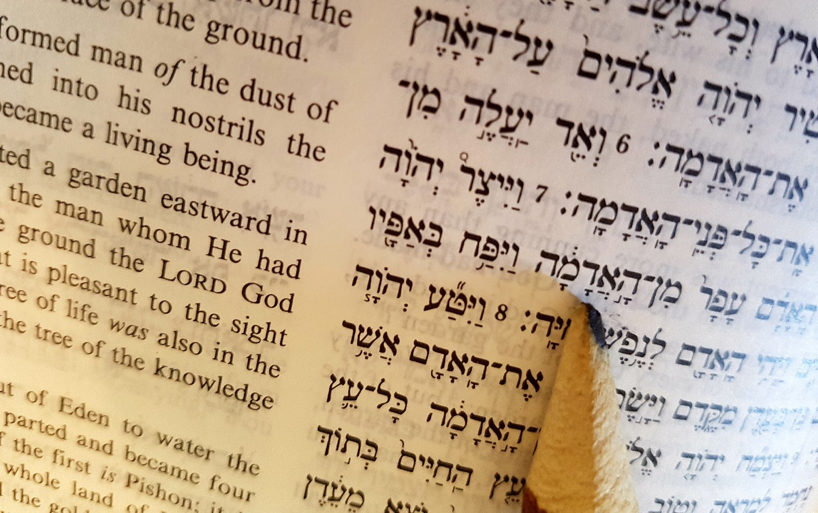How to Read the Bible
An important practical aspect of following the Messiah and believing that He is alive is to read the Bible – the Word of God.
Do you remember when you first became a believer? You may even remember some unique details–who was with you, what the pivotal moment was. Most of all, you probably remember the flurry of changes that happened afterwards.
If you grew up in a believing home and came to faith in the context of safety and familiarity, the story may look a little different. But we can still recall key people in our spiritual development and who helped us grow into maturity.
If you can recall, what was one of the first things your mentor told you when you came to faith? You were for sure encouraged to pour yourself into the Bible–to read it, abide by it, and absorb it. Maybe you even received a copy of the Bible to start fresh that day?
How and Where to Start Reading the Bible
Some people advise new believers to start reading the Bible from the New Testament. They say, it is to understand the message of the Gospel to then “work your way back” to understand the redemption plan. It is as if one were to take a sneak peek at the ending of a murder mystery, to see the smoking gun and catch the “whodunnit” moment.
Without a doubt, the New Testament provides a richness of knowledge about the Messiah, His followers, the early church and its growth, as well as the end times. For these reasons, people are encouraged to start with the New Testament.
This is a common way we approach the Bible through the Western Christian lens. By starting with the New Testament, we using the Tanakh (the Old Testament) to fill in the blanks. Often only if such gaps in understanding arise.
A Hebrew Perspective
However, what would it be like to read the Bible from a Hebrew perspective? What would that look like and why is it important? How can reading the Bible “in a Hebrew way” aid in your spiritual growth?
How to Read the Bible Like a Beginner
When you take a book into your hand, your first thought should be: where else should I start reading but from the beginning? And that is the first thing to understand when approaching the Bible from a Hebrew perspective.
When we read the Bible, we are reading a true account of historical events and people. And at the same time, the Bible is God’s living word and His revelation to us about His nature, character and purposes. Jesus the Messiah is called the embodied word Himself. (John 1:1)
Contrary to the popular belief, It is not that difficult to begin with Genesis. The book gives a fascinating account of creation, the patriarchs and matriarchs, as well as Israel’s early history.
Don’t forget that the Torah – the first five books of the Bible – were the very Scriptures that Jesus and the Apostles drew from. They taught mainly from the Torah and the Prophets, so knowing these books will in fact enrich your reading of the Gospels which often quote them.
Real Events and Real Places in the Bible
The Holy Scriptures are not moral stories or fairy tales that aim to instill in us some lesson to inspire us to do the right thing.
In our school system, in a world literature class or philosophy class, one may read the Bible right alongside the works of Virgil and Homer. Maybe it is just one of many positions of “sacred texts”, next to mythology or even fables and fairy tales.
However, on that long list, one thing is not like the others. The Bible is more than moral literature and more than a story. Even though, without a doubt, even an unbeliever can read the Bible and gain wisdom from it.
When reading the Bible from a Hebrew perspective, you’ll quickly notice that the Bible narrates events with real places and people. It is true of both the Old and the New Testament. The names of many kings and warriors that appear in the Bible have been found by archeologists.
We also read that Jesus moved around real places – He visited the Temple, taught by the Sea of Galilee, prayed on the Mount of Olives, and so on.
Know Your “Why” When Reading the Bible
Knowing your why before reading the Bible can make or break your experience. It can transform your soul and fill you with joyful expectation OR lead you down a path of guilt, shame, moralism and despair.
So, what is your intention when reading the Bible? Is it to understand salvation? Recognize the Messiah in the Word from start to finish? Or maybe reading the Bible is a spiritual discipline for you, something you do every day whether you feel like it or not?
If your “why” in reading the Bible is to be transformed by the power of the Holy Spirit into the image of Messiah and to draw closer to Him, then you are in the right place.
(*Reading the Bible to address addictions, mental health, or marriage and family problems should always be one tool in addition to pastoral care and counseling or therapy with a trusted, licensed professional.)
Reading the Bible as a discipline is good, but just reading to check a box will not change you. If you do it just to “do better” in your own strength, which you are attempting in your own power and without the power of Jesus or His Spirit, the letter of the law will expose your own weakness.
Do You Read the Bible to Fix Your Life?
I had a Sunday school teacher named Bill, maybe Mr. Bill to me at the time, but I distinctly remember “no nonsense Bill” from my church who would raise a Bible over his head and say, “Dusty bibles lead to dirty lives!” He would continue that the more worn your Bible appeared, the better your life looked.
Mr. Bill was right in the fact that following the Bible’s wisdom would surely lead to a healthier life, even peace and harmony in your life. But there is more to say about reading the Bible that Mr. Bill didn’t get across to his listeners in those days. The Bible not only exposes our shame, guilt and shortcomings – it provides a way out.
That is because the Bible gives us a revelation of who God is, His character, His Nature, His love, His work on the Cross – and what all of that means for us today. The Bible gives us hope!
One of the reformers, John Calvin, wrote about something called “Double Knowledge”. It is both the knowledge of God and our knowledge of ourselves. When we see our true selves, with all our failures and shortcomings, there is a temptation to despair, which can lead us to neurotic attempts to fix ourselves.
Trying to fix ourselves in our own strength – without God – will always lead to anguish because we will always fail. Only the Spirit of God can take away our guilt and shame.
Consider Another “Why”
Something that should always be emphasized in today’s world is the Bible’s unchangeable authority. The Word of God protects us from false teachings and false teachers. In today’s world of turmoil and change, many are looking for answers to questions in politics and world affairs.
But what does the Bible say about such things? New books and articles are written every day on every topic. It is important to remember that God gave us His word to abide by and it never expires. Anything beyond that is extra biblical, and if it cannot be verified by the Word of God, then, well, it should be considered irrelevant.
Reading the Bible reveals the true person of the Messiah. As entertaining as it is to watch depictions of the Messiah’s life on television, it is important to remember that these are dramatic portrayals. They include actors, writers and producers. Editorial decisions are made in the script writing process to make the show appealing.
While these depictions can spark meaningful conversations or be a fun way to engage in Bible study, they are not enough in themselves. And they are not authoritative either. We can only grow closer to our Lord through the power of the Holy Spirit and the power of God’s Word.
Best Bible Translation: How to Choose
Choosing a Bible translation is actually no small thing. After all, you want the text to be both accurate and understandable. So, here are some versions we would recommend.
The King James Version (KJV) is still considered to be one of the most accurate and faithful translation of the Biblical texts. For updated language, definitely check out the New King James Version (NKJV). Other reliable translations are the English Standard Version (ESV) or New American Standard Bible (NASB).
Another version worth exploring is the Complete Jewish Bible (CJB). It provides greater accuracy of names and places, using Hebrew transliterations whenever possible.
Translations such as The Message and other that paraphrase the Bible into contemporary vernacular are very popular these days. However, they often deviate from the original wording to put greater emphasis on the emotional valence of the words.
Pick a Time and Place to Read the Bible
The next thing you’ll want to do is pick the right time and place for you to read the Bible.
I suppose it goes without saying that you should opt for a place where you will not be easily distracted or disturbed. But what is more, you could put your phone on silent or “do not disturb”, and let your family or roommates know that you will be unavailable for a little while.
Here is something more important, however. Try to pick a time and place that is consistent. It will help you create a rhythm and a routine. Many people set time aside to work out, it is their “me time” when they do not take phone calls or attend to other people’s wants. Imagine if we approached our time with God the same way!
Maybe you enjoy listening to an audio Bible while you go running or drive in your car. While it is definitely a productive use of time, it is not quite the same as reading. Your intention should be to be fully engaged and focused.
In Hebrew, there is a word called kavanah, which communicates devotion or intention. When we pray with kavanah, it means that we allow our whole heart and mind be absorbed by our prayer. Create a rhythm that will make it easier for you to devote your whole attention to God’s Word and will make your heart sensitive to His Spirit.
“Read the Bible Every Day” – But How?
Most observant Jews worldwide pray with the use of a Siddur, a prayer book. They recite prayers drawn from Scriptures on a daily basis, with special prayers designed for the Sabbath. This means they may start their day by reciting the Shema at the beginning of the day (Deuteronomy 6:4-9) or pray the Amidah (partially drawn from Psalm 55 and Psalm 142).
Some Christians follow a similar pattern and start their day with a “prayer of intentions”, which is based on Romans 12:1-2. It is meant to present oneself to the Lord as a living sacrifice. At the end of the day, they will pray a “prayer of recollections”, recalling the events of the day and bringing them to the Lord.
These types of guidelines can be helpful for people who enjoy structure. But you can find an endless supply of devotionals in bookstores and online (many of them free) that can help you organize your Bible reading time. Sticking to a plan will help you follow a daily rhythm.
Working through a devotional series or a study plan will suggest a unique order of passages to read. They may be focused on a specific topic or issue to help you get familiar with the Scripture.
The Hebrew Approach to Reading the Bible
An important element of the Hebrew approach to reading the Bible is using the weekly Torah and Haftarah portions that align with the Hebrew calendar.
The first Torah portion, Beresheet (named after the book of Genesis) begins at the reset of the Hebrew Bible reading calendar at Simchat Torah. For each week of the year, there are Scripture portions. They include a passage from the Torah and chapter selections from the Prophets or Writings that correspond with the Torah reading.
And good news! You can also find Messianic reading portions, that add a passagr from the Brit Hadashah (the New Testament). The Complete Jewish Bible (CJB) has the Torah and Haftarah portions already built into the text of the Bible, to aid in your reading plan.
To encourage you in your reading, you should consider starting a prayer journal or a reflection journal. Many like to write out their prayers or even write down Bible verses that move their hearts or inspire deeper reflection.
Study Hebrew Words
Another great idea that can enhance your Bible reading experience is studying Hebrew words. You would be surprised how enlightening this process can be and how much more depth you’ll discover. Not to mention the fascinating cross references you may stumble upon!
Studying Hebrew words and verses always adds new light to the Scriptures, and it can completely change our perspective. You can start by browsing through FIRM resources to discover plenty of articles on Hebrew Words and teachings on geographical places in Israel where Jesus taught and ministered.
Reading about the places where Jesus lived, breathed, taught, and ministered, where He was crucified and resurrected, will bring the Bible to life. The Bible does not take place in some mythical place like Middle Earth. All Bible locations are real, situated in the Middle East, mostly in Israel, but some even in Europe. Many you can still visit today!
Read the Bible at Your Own Pace
With all that said, the Bible, the living word of God, is something that you will hopefully study your entire life. You won’t master it or “finish it”, as one might finish a novel.
While you may want to read the entire Bible in a year (a great goal indeed!), it is important that you don’t forsake quality for quantity. Truly try to absorb what you are reading, pray over it, study every word. And let the Holy Spirit reveal to you the matters of God’s heart as you read the Bible every day.
Articles Related to How to Read the Bible: Getting Started and Knowing Your “Why”
Estimated reading time: 13 minutes
Works Cited
Coe, Dr. John H. “Prayer of Recollections in Philippians”,
Director, Institute for Spiritual Formation, Talbot School of Theology
Copyright 2014 John H. Coe. All rights reserved.
Coe, Dr. John H., “Prayer of Intentions”
Director, Institute for Spiritual Formation, Talbot School of Theology
Ways to Pray without Ceasing I Thess. 5:17
Copyright 2006 John H. Coe. All rights reserved.
Strobel, Dr. Kyle “Christmas Homily” Redeemer La Mirada
La Mirada, CA December 25, 2023.





